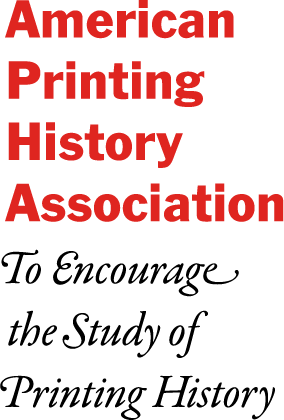Materialities Conference Program
Materialities of American Texts and Visual Cultures
Columbia University, April 9-10, 2015
An International Symposium Convened by the Andrew W. Mellon Fellowship of Scholars in Critical Bibliography. Co-sponsored by the Department of Art History and Archaeology at Columbia University, The Rare Book and Manuscript Library at Columbia University, The Bibliographical Society of America, and The American Printing History Association. All events are free and open to public; please rsvp.
From current historical work on material and visual cultures, to anthropological research on the social life of things and new approaches to seeing and reading in historical scholarship, the study of the physical evidence of culture has become a pressing issue. This interdisciplinary symposium will bring together conservators, curators, and scholars of art history, literary studies, book history and bibliography to reflect on the historical relation between materials, objects, and practices and different forms of visual and textual production in nineteenth-century America.
Program of Sessions
Thursday April 9
Rare Book and Manuscript Library | Butler Library, Room 523
12:30 pm: Welcome and introductory remarks
12:45-2:30 pm: Session 1. Inter-Media Translations
Christopher Lukasik (Purdue University), “The Image in the Text”
Margit Peterfy (University of Heidelberg) “The Author’s Carnival”
Jennifer Greenhill (University of Illinois, Urbana-Champaign), “An undictionarial reading of Mark Twain’s materialities”
Paul Edwards (University of Paris Diderot), “A Persistent Novelty: The Multiple Origins of the American Literary Photobook”
Chair: Marie-Stephanie Delamaire (Columbia University)
2:45-4:15pm: Session 2. Industrialization of Texts and Images
Michael Leja (University of Pennsylvania): “Almanacs and the ‘Image Campaign' of 1840”
Todd Pattison (Northeast Document Conservation Center), “Outside Information: Nineteenth-Century Bookbinding Mistakes”
David Jaffee (Bard Graduate Center), “New York and the Culture of Capital in the Nineteenth Century”
Chair: Paul Erickson (American Antiquarian Society)
4:15 pm-5:00 pm: Coffee
Rare Book and Manuscript Library Hands-on Session
5:00pm Keynote
Jennifer Roberts (Harvard University) “Wood-Work”
6:15pm: Reception (Judith Lee Stronach Center, Department of Art History and Archaeology. Schermerhorn Hall, 8th Floor)
Friday April 10
Department of Art History and Archaeology (Schermerhorn Hall, Room 612)
9:30am-10am: Coffee & Pastries
10am: Keynote
Phillip Round (University of Iowa): “Cultural Shorthand: Orthographies and Sovereignty in Nineteenth-Century Native America”
Respondent: Elizabeth Hutchinson (Barnard College/Columbia University)
12:00-1:30pm: Lunch (on your own)
1:30-3:00pm: Session 3. African-American Book Cultures
Jonathan Senchyne (University of Wisconsin, Madison), “Typography of the Oppressed: Slavery and Material Culture of Print”
Christopher J. Dingwall (University of Chicago), “Of Black Books and The Soul of Black Folk: W. E. B. Du Bois, the Memory of Slavery, and the Racial Commodity”
Dennis Williams “Portraiture and Text in African-American Illustrated Biographical Dictionaries, 1865-1900”
Chair: Sarah Blackwood (Pace University)
3:00-3:30pm Coffee
3:30-5:00 pm: Session 4. Print in Motion
Layla A. Bermeo (Harvard University), “Borderlands Between Text and Image: The United States, Mexico, and Mapmaking 1830-1861”
John Garcia (McNeil Center for Early American Studies, University of Pennsylvania) “The Industrial Book and the US Mexican War”
James Berkey (Duke University) “The Folds of War: Soldier Newspapers and the Materiality of Print”
Chair: David Jaffee (Bard Graduate Center)
All events are free and open to public; please rsvp.
